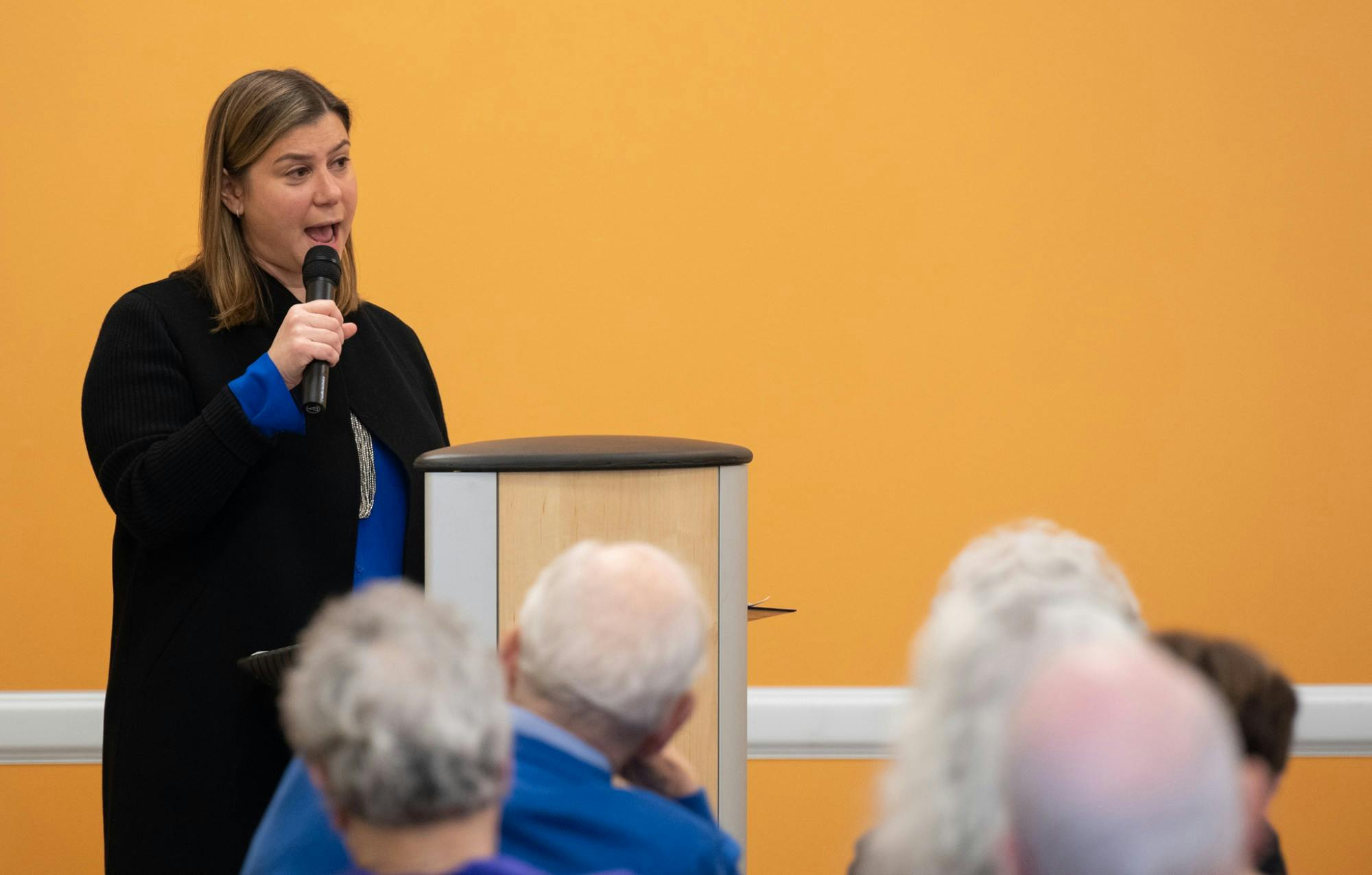Rep. (MI-8) Elissa Slotkin hosted a community conversation late Sunday morning in light of recent anti-Semitic incidents in the Greater Lansing area.
The meeting, which took place at the East Lansing Public Library, comes just one week after a swastika was spray painted outside the Pi Kappa Alpha (PIKE) fraternity house at Michigan State University and four months after a Sukkah was vandalized at the MSU Hillel on Sukkot, a Jewish holiday.
Slotkin mentioned other recent acts of anti-Semitism in the area such as a mezuzah that was ripped off the door of an MSU student last September and anti-Semitic graffiti that was spray painted on multiple businesses in Livingston county.
The meeting was led by Slotkin along with other panelists including Michigan Attorney General Dana Nessel, regional director of the Michigan Anti-Defamation League (ADL) Carolyn Normandin, director of community-wide security for the Jewish Federation of Metropolitan Detroit Gary Sikorsk and Civil Rights Coordinator and International Human Rights Coordinator for the FBI office in Detroit Joseph Lupinacci.
With such a recent rise in the number of reported anti-Semitic incidents, Slotkin said there is an immediate need to take action.
“According to the FBI hate crimes statistics in 2018, attacks against Jews accounted for 57% of all (anti-religious) hate crimes in the United States. In the 11 days between Dec. 23 and Jan. 2, 2020, there were 13 reported anti-Semitic attacks in the state of New York alone,” Slotkin said.
In addition to challenging hate-based anti-Semitism crimes, Slotkin said community members need to call out the use of stereotypes, even when intended as positives.
“One of the most difficult things to do … is to confront anti-Semitism when someone does it meaning to be complimentary,” Slotkin said.
Normandin underscored this highlighting the importance of recognizing such statements as microaggressions.
“The ideology at the wide end of the spectrum is usually ignorance. It’s usually not meanly intended,” Normandin said. “As it is left unchecked and as it escalates up and it becomes more systematic, then you get to assaults.”
A member of both the LGBTQ and Jewish community, Nessel said she notices negative reactions to her Jewish identity.
"In terms of the negative slurs that are used against me, whether it's on social media or things that are sent to my office via email or letters, far more in the way of anti-Semitic comments than those that are homophobic," Nessel said.
Last year, Nessel said her office created a hate crimes unit to battle the onslaught of hate crimes against minority communities in Michigan.
Joel Sharkey, a Jewish community member in attendance said it is important to understand that microaggressions are the base of the “pyramid of hate” and that it is necessary to confront others when they make comments in this light.
“We are all different, we all come from very different backgrounds,” Sharkey said. “ ... We’re all going to be different in where we came from, but not in who we are.”
Serving on the House Committee on Homeland Security in Congress, responsible for the oversight of the Department of Homeland Security, Slotkin said there has been a particular focus on the rise of domestic terrorism.
The ADL, an anti-hate organization seeking to establish a world in which no group or individual faces bias, discrimination or hate, has placed a strong emphasis on the need for the public to report when they witness these crimes.
“The organizers of ADL realized if we weren’t going to be safe as Jews, no one was going to be safe. And if other people weren't going to be safe, we weren’t going to be safe as Jews,” Normandin said. “ ... At the end of the day, it takes every single person, every person in this room, every voice to stand up against hate.”
Rabbi Hendel Weingarten of the Chabad House for the Greater Lansing and MSU area said the importance of addressing issues of anti-Semitism lies in uniting the Jewish community.
“The ultimate goal in the Jewish community and for the whole world is a time of peace and harmony,” Weingarten said. “Before it gets better, things are gonna get worse. Right now is that worse time when we pray and we do everything that we could to be a united Jewish community, unite the world and to be a light to the world to show them that we want to be positive.”
Support student media!
Please consider donating to The State News and help fund the future of journalism.
Slotkin says she intends to host more conversations, not just for the Jewish community, but for all communities.
“If hate crimes are on the rise, it’s not just the Jewish community,” Slotkin said. “ ... We have to understand that a little incident at work, or a little thing that we see when our kids are at college can’t be treated in isolation. That we have a responsibility to not just see something and say something, but to act.”
Discussion
Share and discuss “Rep. Slotkin addresses anti-Semitism in East Lansing ” on social media.







